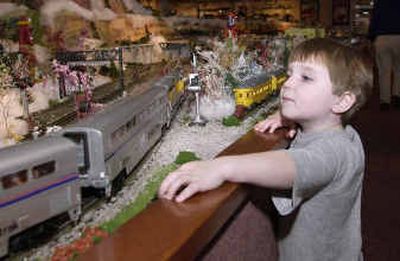Running out of steam?

CHESTERFIELD TOWNSHIP, Mich. — After chugging along for more than a century, Lionel LLC, the venerable maker of model trains, is struggling to stay on track following a nearly $41 million judgment that pushed it into bankruptcy.
The ruling against Lionel, once the world’s biggest toy maker, has exacerbated the company’s existing problems in an industry where there is intense competition for a small and demanding group of customers. Despite the confidence of the Lionel’s new management, reviving the company is no easy task in an era of video games and Wal-Mart-style retailing, in which all toy train makers are struggling to appeal to new generations of hobbyists.
And critics say Lionel has let its younger competitors get an edge by failing to aggressively pursue technological innovations.
But Lionel, based in Chesterfield Township, still has one valuable asset smaller rivals can’t claim — a name steeped in tradition. That goes a long way with the adult train enthusiasts who make up the bulk of the industry’s consumers.
Neil Besougloff, editor of Classic Toy Trains magazine, estimates there are about 100,000 to 125,000 toy train hobbyists in the United States and Canada. The more than 60,000 readers of Classic Toy Trains spend an average of $1,400 to $1,500 a year on the hobby, according to the magazine’s surveys.
“The hobbyists today are mostly men in their 50s,” Besougloff said. “When they grew up in the 1950s, they had Lionel trains and American Flyer trains, and that was their prized toy. … They are to some extent reliving the joys of their childhood.”
So intense is the world of toy trains that Lionel chief executive Jerry Calabrese held an online chat three days after the company filed for bankruptcy to slow the rumor mill and assuage fears that Lionel might go under. Calabrese — who became CEO in October and previously worked for comics heavyweight Marvel Enterprises Inc., a similar hobby-driven business — said he would hold such sessions regularly.
Lionel’s current troubles date back at least to 2000 when MTH Electric Trains, formerly known as Mike’s Train House, sued Lionel. MTH, a one-time Lionel contractor based in Columbia, Md., accused the company of selling trains based on designs stolen from a South Korean manufacturer working for MTH.
In June, a jury in U.S. District Court in Detroit ruled that Lionel should pay $38.6 million to MTH and Lionel supplier Korea Brass Co. should pay $2.2 million.
Lionel denies the accusations, and Calabrese says he is confident the court decision will be overturned or the award reduced on appeal. In the meantime, Chapter 11 bankruptcy, which Lionel entered last month, protects the company from having to post a bond while the appeal is pending.
Calabrese insists the court decision is the only reason for the bankruptcy, and that, overall, the company is in good financial health.
“Lionel is having a better year this year than it had last year, which is something I dare any other train company to say,” he said. As a private company, Lionel does not release earnings information.
Lionel and other toy train companies enjoyed a boom that peaked in 2000. But business slumped as a result of overproduction and of post-Sept. 11 economic uncertainty, Besougloff said.